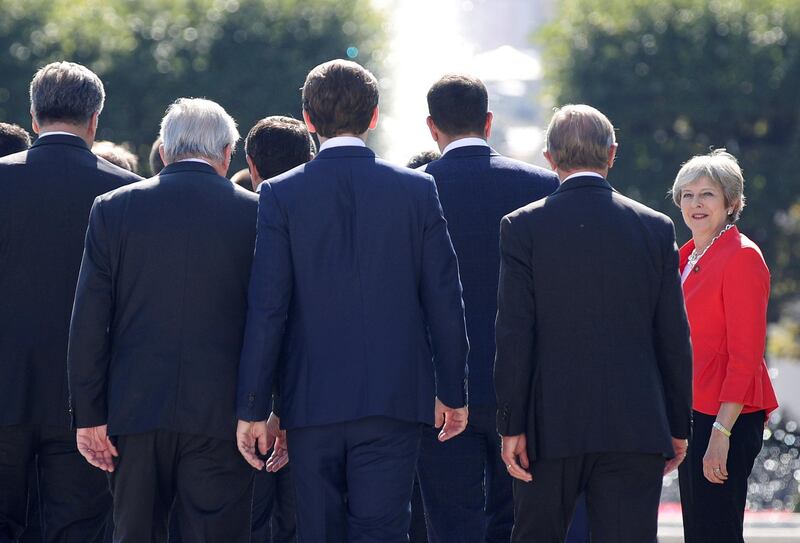The gloves are off in the fight over the shape of Britain’s exit from the European Union.
A showdown in Salzburg in Austria punctured the unreal bubble of collusion that had endured since the Brexit referendum in 2016.
To the dismay of those who cherish international systems and institutions, it is now clear that Brexit won't settle the argument over Europe's future. Instead it now threatens to set up the long-range break up of the continent.
The Brexit argument that the overarching politics of Europe is self-interested and unbending is now unanswerable.
Politicians steadily losing their grasp on their own politics on Thursday rallied for the cheap thrill of knocking down the vulnerable British leader.
Emmanuel Macron, who has alienated more French people than he has won over, lead the sneer-fest, kicking at “the liars” responsible for Brexit.
Riding shotgun was Angela Merkel, the veteran German leader who now barely clings to the chancellor’s office. Enfeebled, she spent last week failing to sack a German domestic intelligence supremo who consorted with the far-right and rubbished her version of a race-hate protest.
In the end the spymaster was promoted, not ousted.
Virtually every one of the heads of government gathered in Austria could be found wanting in this fashion.
Yet these men and women are the custodians of Europe. At the table, which was visually reminiscent of a villain's lair in a James Bond movie, the group decided to rough house Theresa May’s carefully modest proposal for a Brexit that was not horrendously disruptive.
The summit resembled nothing so much as a giant act of collective displacement to camouflage the real issue. This is a European culture war that is centred on immigration.
There is broadly a split between the most developed countries and those with less dynamic economies.
Appropriately for the Salzburg setting, the dividing line is currently centred on the Tyrolean countries (Germany, Austria and Italy) but shifting ever further north and west.
Britain is leaving Europe to get away from steadily deepening crisis. There is an argument that it is jumping too soon before the contours of the fallout are clear. (An argument holds that it is leaving too late, having already encumbered its economy with European inefficiencies.)
Unfortunately for Mrs May, the moment of clarity over the Brexit negotiations heightens her domestic difficulties. As her motorcade travelled to Downing Street on Friday, the British prime minister was frantically pulling together her response.
On Friday, newspaper front pages screamed "humiliation". It felt like she was an ambush victim. A day later, the headline writers were defiantly behind Mrs May.
For what choice did she have but to stand firm? While the split screen showed the pound falling on the foreign exchanges, she made two clear statements of resolve. She would not offer concessions on the Irish border as the price of Brexit and she demanded serious consideration of a trade partnership that would not congeal the western European economy.
Yet the grenade-throwers who scorn a negotiated Brexit, both in Europe and in Britain, are freshly emboldened.
There is much pointless talk, including by some of the European leaders indulging in idle speculation, about a second referendum to keep Britain in Europe on the current terms.
The cavalier and dogmatic approach that Europeans have shown towards the British has alienated swathes of moderate opinion. As a result of not being listened to by the other side, the Brexit world view has a growing credibility.
The history of Europe is one of coming together because the collective group gave shelter from geopolitical ravages. A vision of close and neighbourly partnership is a tricky proposition when an acrimonious divorce is on the table.
The one certainty – that Britain would leave the EU at the end of March – must now be in doubt. Shifts will be quick and transformational. Lurking in the wings is the Marxist Labour Party.
It is possible that Mrs May will be unseated by a Conservative revolt when her party meets for its annual conference next week. Alternatively, she can capitulate and accept a new strategy.
It is possible that the complete breakdown of the talks will happen next month. It might not be possible for the two sides to even agree a temporary deal to keep ports open when Britain leaves.
If there is a divorce, agreeing the trade deal – which is supposed to kick in during 2020 – might never happen. Europe might just have said "auf weidersehen" to Britain.





